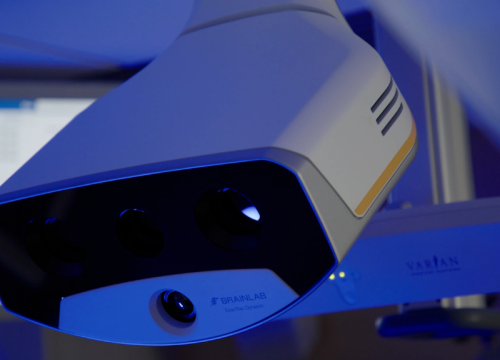If you’ve been diagnosed with a brain tumor, we’re here for you. At Valley, we never forget the person behind the diagnosis. And we always treat the whole patient — mind, body and spirit.
Our team has experience diagnosing and treating all types of brain tumors, including:
- Cancerous (malignant) tumors, such as gliomas
- Cancer that has spread to the brain from another part of your body (metastatic)
- Noncancerous (benign) tumors, including meningiomas, pituitary tumors and acoustic neuromas
When you turn to Valley for brain tumor care, you’ll receive individualized treatments that are anchored by advanced technology and delivered by specialists. For instance, our neurosurgeons specialize in noninvasive and minimally invasive brain tumor treatment. These procedures provide excellent results with less pain, a shorter hospital stay and a faster recovery.
At Valley, you’ll also receive the support you need to understand your diagnosis and navigate your way through treatment and recovery.
Patient Stories

Explore stories of strength and inspiration from Valley patients who have been treated at Valley's Brain Tumor Program.
The Valley Approach to Brain Tumor Care
Your Neuro-Oncology Team
Neurosurgeons
William Cobb, MD, PhD
Anthony D'Ambrosio, MD
Rupa Juthani, MD
Medical Oncologist
Eli Kirshner, MD
Radiation Oncologist
Chad DeYoung, MD
The process of receiving brain tumor care can feel overwhelming. But at Valley, you’ll have a nurse navigator to help guide you and your family through this journey. They will find answers to all of your questions and make sure you’re receiving the best possible care.
Our brain tumor specialists start by doing a complete evaluation and giving you personalized advice about the treatment that would work best for you. We take into account not only your diagnosis, but also your unique preferences and treatment goals.
We also offer second opinions to help you explore all of your treatment options if you’ve been diagnosed with a brain tumor elsewhere.
Brain Tumor Treatments
At Valley, you’ll find the best of both worlds. Our highly specialized team offers the most advanced brain tumor treatment options, in a comfortable setting close to home. You don’t have to travel to the city to have access to technologies and techniques that help improve outcomes, including:
- Minimally invasive brain surgery: Whenever possible, we choose minimally invasive surgical techniques that use small incisions or no incisions at all.
- Awake brain surgery: In some cases, we can operate on your brain tumor while you’re awake and alert. Your surgeon will monitor your responses (and your brain activity) while asking you questions or giving you commands. This helps ensure they don’t damage the parts of your brain that control sight, speech, or movement.
- Fluorescein-guided surgery: We can give you a harmless liquid solution that causes your brain tumor to glow when viewed on a special imaging screen. This makes it easier for your surgeon to see the size, shape, and location of your tumor during surgery.
- Gamma Knife radiosurgery: This noninvasive treatment sends targeted beams of radiation into your brain.
- Transsphenoidal surgery: This is a minimally invasive pituitary tumor surgery that allows us to remove pituitary tumors through the nose vs. using a large incision.
Minimally Invasive Brain Tumor Treatments
Whenever possible, our neurosurgeons use minimally invasive or noninvasive procedures to treat brain tumors.
For example, if your tumor is located in a hard-to-reach area, your neurosurgeon may use a state-of-the-art minimally invasive approach. Advanced imaging technology and innovative tools (tubular retractors) enable our experts to treat brain tumors through very small incisions.
If your tumor is malignant or metastatic, Valley’s Gamma Knife technology can be a highly effective, noninvasive treatment option. Its pinpoint precision spares surrounding healthy tissue, resulting in significantly fewer side effects than whole-brain radiation. Our state-of-the-art Gamma Knife center is staffed by a team of experts who specialize in integrated, comprehensive brain tumor care.
Benefits of minimally invasive surgery and noninvasive treatments include:
- Less time in the hospital; you may be able to go home the same day as your procedure.
- Lower risk of complications like bleeding and infection
- Faster recovery
Conditions Treated
- Acoustic Neuroma (Vestibular Schwannoma)
- Astrocytoma
- Brain Metastases (Metastatic Brain Cancer)
- Brain Tumor (Benign and Malignant)
- Craniopharyngioma
- Glioblastoma
- Glioma
- Meningioma
- Pineal Tumor
- Pituitary Tumors
- Skull Base Tumors
- Spinal Cord and Nerve Tumors
- Spinal Metastases (Metastatic Spinal Tumors)
- Spine Tumors
Why Choose Valley for Brain Tumor Care?
- Dedicated to the least invasive approaches: Advances in brain tumor treatment allow us to achieve excellent outcomes with minimally invasive options that make treatment easier on you. You spend less time in the hospital, have a lower risk of complications and recover more quickly.
- Treatments closer to home: We offer the same level of expertise and leading-edge tools and techniques that you’d find at most big-city medical centers. This means you don’t have to travel as far for the same treatments you’d receive elsewhere. You’ll find all the brain tumor specialists and services you need right here in Northern New Jersey.
- The most advanced technology: Leading-edge treatments like Gamma Knife are available at just a few health systems in the region. The Valley team has deep expertise in treating brain tumors with this noninvasive option.
- Collaborative care: At Valley, you have access to a team of experts who work together to make sure you receive complete care and support. Depending on the type of tumor you have, you may see doctors and nurses who specialize in medical oncology, radiation oncology, brain surgery, or pain management. Your care team may also include dietitians, social workers, physical therapists occupational therapists, and speech therapists.
- Brain surgery planning: Our team carefully maps your brain before surgery. This mapping helps us pinpoint precisely where your tumor is located and find the best way to get there. For example, we can confirm where (and how deep) to place surgical instruments without harming healthy brain tissue.
- Neuroscience intensive care unit (ICU): Specialists in our neuroscience ICU care solely for patients who have a serious neurological illness or are recovering from brain surgery. Not only will you have a private room, but you’ll be cared for by doctors, nurses and other providers with advanced training in critical care and neurological disorders.


















